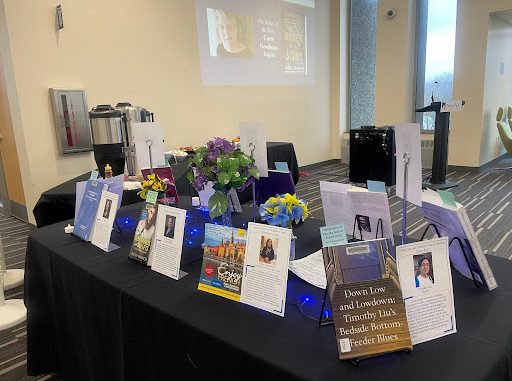
On March 6, SUNY New Paltz held its annual Celebration of Faculty Authors event in the Sojourner Truth Library. The event, put together by the Dean’s Office, recognized the scholarly and creative works written by the university’s faculty over the past year.
President Darrell P. Wheeler opened the event with a speech. “I want to say how proud I am as a president that at a comprehensive university, we have this scope and scale and depth of scholarly and creative contribution,” he said. The intellectual accomplishments of SUNY New Paltz faculty members reflect greatly on our university.
Provost and Vice President of Academic Affairs Dr. William McClure said, “We produce knowledge, we produce educated students,” illustrating how the intellectual accomplishments of faculty members reflect on our university.
The floor opened for the authors present to talk about their works, providing insight into their research and development. French professors Mary Christensen and Mercedes Rooney collaborated to develop “Enjoy French,” a textbook for those moving from an intermediate to an advanced language level. Christensen, whose focus is 17th-century French literature and autobiographies, noted that the textbook represents a departure from her usual area of research. Her willingness to take on a new challenge created an innovative resource for French language instruction.
Psychology professor Glenn Geher spoke about his book “An Introduction to Positive Evolutionary Psychology.” Geher invited several of his students to contribute to this work. They “sat down and worked on this book together, and were thrilled when it got accepted,” said Geher.
One of these students, Julia Lombard was present at the talk and spoke about her experience working on the book as an undergraduate. “It was just such a great collaborative team and we were able to really delve into the research of evolutionary psychology and synthesize it in this really great handbook,” said Lombard. Geher’s inclusive approach exemplifies how hands-on learning opportunities can enrich students’ academic careers and produce meaningful scholarly outcomes.
SUNY distinguished Professor Emeritus of geography and asian studies Ronald Knapp spoke about his book, “Theodore Burr and the Bridging of Early America: the Man, Fellow Bridge Builders, and Their Forgotten Timber Spans.” What started as an article transitioned into a book, allowing Knapp to dive deep into Burr’s life through archival research. “With a colleague of mine who teaches in Ohio, we decided we were going to write an article and this article, just like the pandemic, got longer and longer and longer,” said Knapp. As the first full study of Burr, the book brings new details to light about the 19th-century American bridge-building pioneer.
Patricia A. Fitzpatrick, associate professor of Spanish in the Department of Languages, Literatures and Cultures, discussed her book “Lorca’s Immanent Mysticism.” This is Fitzpatrick’s first book, which originated from her dissertation. Fitzpatrick drew upon her knowledge to explore themes of mysticism in the works of the late Spanish poet Federico García Lorca. It incorporates Lorca’s works for an insight into the mystical undercurrents within his oeuvre.
Cyrus Mulready, a professor in the English department, wrote “Object Studies: Introduction to Material Culture.” The book is based on a course that Mulready has been teaching in the honors program for about 10 years, which teaches “an interdisciplinary approach to material culture.” He saw the need for a text that brought together perspectives from various fields and compiled the book in collaboration with students, colleagues and the local historic site Huguenot Street.
President Wheeler closed the event. He acknowledged the amount of energy put into the authors’ works and how these accomplishments “are central to the mission of an engaged scholarly community.”
